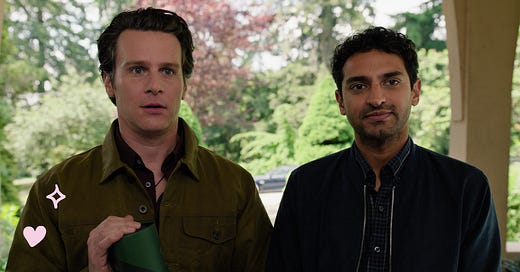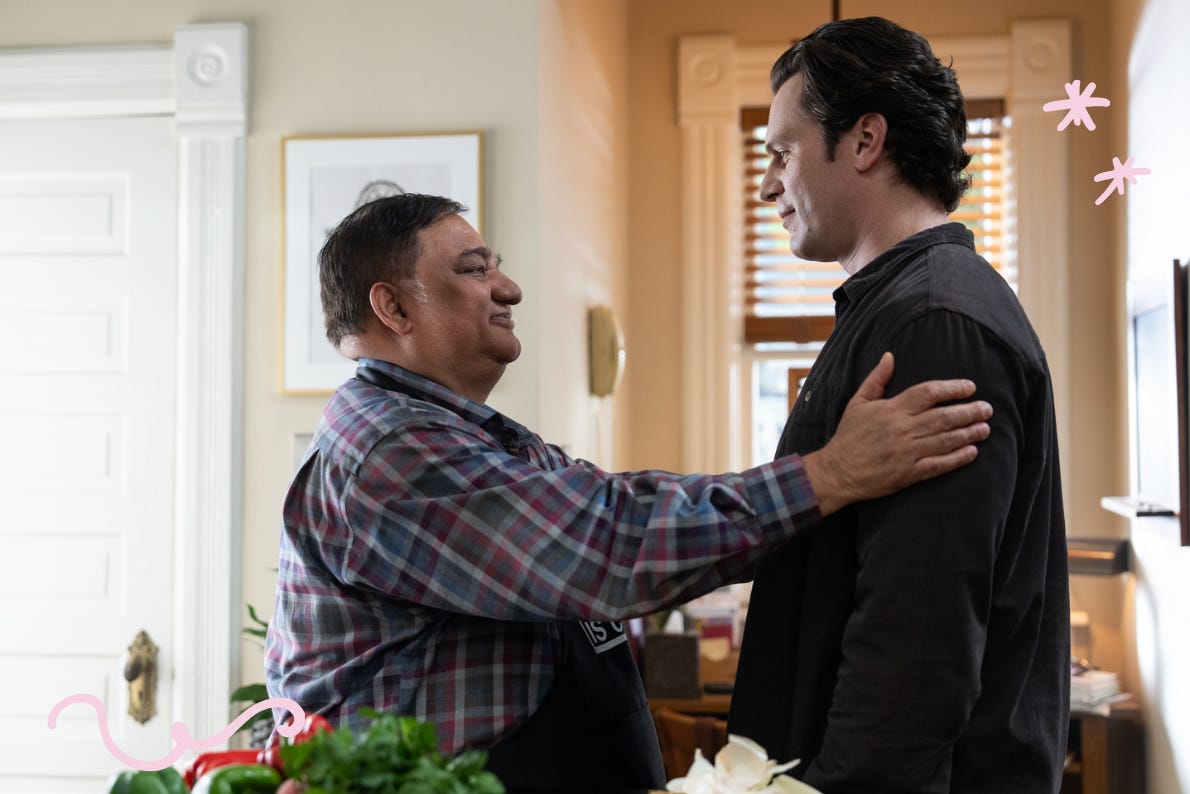Hello <3333
It’s always nerve wracking to bring someone home, but what if you haven’t been entirely open with your family about your sexuality, or their ethnicity?
That’s the premise of the film A Nice Indian Boy, a romcom which follows Naveen, an Indian American doctor who brings his white partner home to meet his very traditional family.
In this episode, actor Karan Soni (Deadpool, Detective Pikachu, Spider-Man: Across the Spider-Verse) and director Roshan Sethi talk about awkward parents, LGBTQ stories in Bollywood, and putting together a gay Indian wedding on screen for the first time!!!
✿ ✿ ✿
Our interview is below (lightly edited for clarity).
Roshan Sethi, director: “It was based on a play called The Nice Indian Boy by Madhuri Shekar. She wrote the play in 2014 and a company financier, producer optioned the play and then actually sent it to us as a script that had been written by a screenwriter named Eric Randall for consideration as a team to direct. So we didn't find the underlying material, but it happened to correlate with something that we were going through personally, which was I had just come out.
Only a few years before I received the script, Karan and I were, are in a relationship. So we ended up being really excited to take it on based on that experience.
Were there themes in the film you knew from the beginning you wanted to include or address?
RS: Yeah, just that it ends in a big gay Indian wedding I think was important to everybody involved because it's never really been done on screen before. There's never been a same-sex Hindu ceremony. And that it have a tone of joy and love. Because if I had actually been tasked with writing a movie about being gay and South Asian, I think it would be much darker and more harrowing than what Madhuri and Eric have written. And that was the thing that I was amazed by in the script, is it had a very populous tone.
It wasn't like trying to be an obscure piece of art. It wasn't trying to be harrowing and trenchant and it was just full of joy. So that was the tone I think we all immediately signed on for.
Karan Soni, actor: The other thing that we really liked about the play and the movie was that the parents were such a big part of it. Like they felt like such full characters. Often in these kind of movies, the parents are the butt of the joke or they become caricatures and we always thought that was the superpower of the play and the movie is that these characters that you think at the beginning of the movie are laughing at, maybe a little bit by the end of the movie are the characters that are probably gonna make you cry the most, and you misunderstood them or misjudged them and that felt unique and special about this project.
TO: The parents line really affected me because I have a really complicated relationship with my dad. And I was just wondering, like because there was a scene in the film where she was like, I don't wanna say the wrong thing 'cause that might be the end of it’. Do you feel like making this movie has really opened up perspectives for you in terms of parents and their generation for you both?
RS: It gave me a lot of empathy actually for my family because the play really forces you to consider their perspective. Interestingly, that line where she says, “when you bleed, we bleed for you”. Or when you even prick your finger, whatever, “we bleed for you”. That, and that reveal of that speech that she doesn't understand them had been cut from the script and I restored it because I was so struck by it from the play, and it really moves me every time I see it and hear it.
KS: You always learn something because a lot of straight men, when they watch the movie, they're always like, I cried in one scene and it's always the same scene for straight men, which is my character and dad in front of the wedding venue, and I'm basically uninviting him potentially to the wedding and they have the father-son sort of moment in the car.
And that is, it's so interesting, what different people take from the movie, but every straight man is that's me trying to talk to my dad and not making any progress. And there's always very interesting, like different people's experiences with their families, gay, straight men, women, whatever it is, they find different scenes that are all related to the parents, which is cool.
One of my favourite scenes is when Jay (Jonathan Groff) starts cooking with your dad in the movie and he starts adding dates to the meal or suggests it and then he ends up adding it. And this moved me so much, was there a scene for you both that you found really affecting?
RS: Yeah, I felt the most affected on set when they actually got married at the end of the ceremony and they walked down the aisle and people throw petals.
Maybe because I had never imagined being there in that moment for that both witnessing something that was real, but then being part of creating it for something that's actually fake, like the whole thing was so insane and Karan is in it and is my real life partner, but he's in the wedding. So the whole thing was very emotional.
Watching the movie, I find myself not really affected by that part at all actually. So it wasn't like the onset experience. The part that affects me is always the same scene, which I think you just mentioned, where Jonathan and Harish Patel, who plays Karan's dad or cooking together, that for some reason that scene almost really gets me.
KS: For me performing it was this, it was the scene where there's the first proposal at the accidental one. That one was always because it felt like this character so rarely was showing emotion, and in that scene. He goes from being so quiet and repressed to literally expressing the highest level of love, which is to ask someone to marry them.
And performing that in a very short amount of time always felt like it's all burbling inside. So that one was a big one while performing. That always felt emotional.
I loved how you remake that scene in DDLJ to propose. Do you feel there's been a shift in LGBTIQA+ visibility in Bollywood movies?
RS: There have been a few Bollywood movies that have explicitly addressed LGBTQ identities. And that was definitely like unimaginable 15 years ago. So there's certainly been progress made. But I wouldn't say it's gone as far as everyone would like.
KS: Yeah. They're never the leads, they're always the supporting characters and it still feels like there's some shame there, to be honest. 'Cause they're not unabashedly being themselves if they have love interests. It's a little bit hidden and it doesn't feel like it's being celebrated always in the way we are trying to with this movie.
What kind of shift would you like to see, in terms of stories being told?
RS: I think that hopefully there would be a move towards more LGBT content. There is quite a bit of it actually in the independent film scene, but not as much in mainstream Bollywood out of a sense of fear - I'm sure, I'm assuming that's behind it.
But India is a rapidly changing place. It was illegal to be gay technically until 2018. That penal code was overturned. That penal code, interestingly, was inherited from the British who brought Victorian morality to India, where laws against homosexuality and even against being transgender didn't exist prior to the British arriving.
Now there's a big movement underway to legalize gay marriage, and I feel that it will happen in the next decade in India. So India is just rapidly changing and hopefully the arts will reflect that. Sometimes it feels like the arts are meant to be a mirror to society, but they actually often lead society and we sometimes forget that.
A lot of the critical gay representation in American cinema and TV is the reason I think that we were eventually led to gay marriage, I think beyond the Ellen DeGeneres show and Will and Grace both had a huge impact on being gay in America before any of those things were legal.
My sister-in-law married an Indian man, and the ceremonies were so beautiful and colourful. You mentioned that it was the first time in a ceremony it’d been portrayed like this in a movie. How did it feel being able to put that on screen and filming it for you both?
RS: It felt amazing. I think the hardest part of it was just finding a pandit who was willing, A pandit is the Hindu equivalent of a priest. The word pandit actually means priest. And it's made its way into the English language to mean something else.
But we have a tough time finding a pandit who is willing to help us tailor the Hindu ceremony to a gay couple and experienced a bit of homophobia in Canada. I actually had a pandit text me the F word, which was crazy. But we eventually did find someone who was willing to help us in the ceremony that you see is adapted from what a real Hindu ceremony would look like.
But it was, yeah, it was really difficult. It was actually the thing that stressed me out the most, because I'm not a priest and I don't know what they're up to around that fire. What they're planting, what they're throwing, which directions they're moving. But I wanted it to be authentic.
Then when I received that text from the priest, I thought, what do I care if they're rejecting me? What do I care about safeguarding their traditions when their traditions have just led them to hate? But then I ended up finding in the directing of it at least a balance where it is actually, I think, very authentic.
But it brings it into the new world, and that's how cultures work. Every single culture in history has adapted and readapted and readapted and all the things that we hold as being ancient or actually an amalgamation of a million different movements and fights and struggles and nothing is like homogenously carried down from antiquity.
TO: And you mentioned in the director’s statement that you’re getting married in a few months. Congratulations!!
KS&RS: We're gonna go to a courthouse. We're gonna go to a courthouse and then we're gonna just get married. Like in a very lowkey way.
TO: I love that. That's so romantic.
KS: Yeah, we don't wanna, we're definitely not doing a big Indian wedding, we both didn't wanna do that, and then we made this movie and then it was very much made clear for us that we're good. It seems too stressful.
TO: In creating your character I was just wondering if you had personal experiences that you brought to the role?
KS: Yeah, for sure. I came out when I was 19 and I played this part when I was 34, so there had been a long time since. A lot of the things, not that it's a coming out story, but the characters in this other phase of coming out, which is, he said he's gay, but he's just not been gay openly with his family and friends in many ways, which is he's still closeted in some parts.
That part was, it's been a while since I had been in that situation, but all those feelings came back very easily because it was such a big part of my existence for so long. And then the challenge with this part was how to show all of that, how to show that he has these emotions, but not show them too much because then he would be expressing them.
So it was always this delicate balance and Roshan really helped with that. And like you have to trust, that you're actually doing less acting than maybe you would be otherwise. And then you have to trust that. On the monitor, the director's oh, it's reading that. Like you can see clearly what this character wants.
Like one of the hardest scenes for me was the first date scene where we're at the bar and the character having to show that he's falling for this guy, but he is also really scared of this guy and how open he is and like all of that in the same scene, without saying what he wants. And so Roshan really helped guide through that of being like, oh, you're showing a little bit too much here, or you can pull back there.
Or maybe that's a little bit too cold. Like you can find the balance. And that was really a fun challenge with something like this.
TO: Karan, you played a version of Spider-Man in Across the Spider-Verse, Pav, will you be in the next one and can you say anything about it?
KS: I can't say anything about those. The next one, I hope I'll be in the next one. I, they have not read the script or anything, but even if I had, they would not let me say it. But I was such a fan of the last one actually, when we were making A Nice Indian Boy in Vancouver the movie just had come out in theatres while we were filming, so we all went to go see it. So that was really fun as a cast.
I made them go see me on the big screen.
TO: Have you had the chance to show a nice Indian boy in India or to the Indian community, and what was their reception like?
RS: Yeah, it feels like aunties across America have watched it. It will be released in India. I don't know when - there is an Indian distributor who is working with the censorship board right now, which has not many cuts and it's apparently not a big deal to get it past them and it was supposed to have a theatrical release.
I will say. I think it's just been screened across India already. 'cause I keep getting tagged by people. Like villages watching the movie, like on USB sticks and shaky footage, and there's this thing called the Box in North America that streams Indian content and the movie is like illegally on the box.
So I don't know, they pirated it. And at first I was like, should we stop them? And then I was like, they're gay in India, so just let them live. So now I'm doing nothing.
KS: But in Australia, people should go to the movie theatre to watch the movie.
RS: Don’t pirate it Australia, July 10th. Yeah. It actually is just a movie that's better to watch in theatres. And I don't say that insincerely or just because we're involved with it, it just literally is. And it's hard to have those experiences with other people where you're laughing and crying together. And it's actually a biological imperative. I'll just say as a doctor for a moment, that we laugh together, not alone, but together. So I think it's important to see in theatres if you can.
TO: For young people in India or across the world watching this what kind of message do you hope they'll get from it?
RS: Just that that an Indian family can look all kinds of ways. And I think south Asian families are often very concerned with projecting a certain appearance of not having a blemish and being successful. But that every South Asian family, and I'm sure every immigrant family is full of all kinds of things that are going right and wrong, and we're all complicated and human.
What about for you, Karan?
KS: I think what was special for both of us was that the movie is a joyful movie. It has a happy ending and often in gay stories or movies it can sometimes be about the trauma or the sadness of things. And then this movie has the final image where two men are getting married in an Indian ceremony, which you don't really see on screen.
So many Bollywood movies, so many Hollywood movies are wedding movies that end with a straight couple getting married. And so to have the image of these two men doing it, I hope is like something that kind of gets people excited and hopeful if they wanna one day have that or just even see that image in a movie because you're so used to as a queer person, just seeing one kind of couple.
And so that is exciting. And then I think also, there's so many more interracial couples now, and I feel like we need more stories in general about like cultures mixing and marriage and all the stuff that comes with that 'cause I think that's what's unique about the movie too.
✿ ✿ ✿
thanks so much for reading and listening, I love you!
Thuy











Share this post